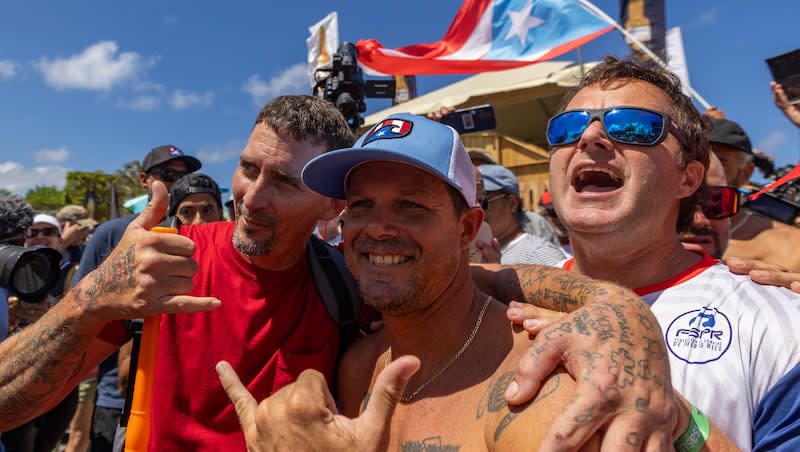Here’s what the IOC says the Paris Olympics offers in ‘dark times’

- Oops!Something went wrong.Please try again later.
The 2024 Summer Games in Paris were touted as bringing hope to an increasingly divided and violent world by International Olympic Committee President Thomas Bach on Wednesday, as tensions continue to escalate over the restrictions on Russian athlete participation.
“The people around the globe, they are fed up with all of the hate and the aggression, the extremely negative news, the wars, the conflicts they are facing day in and day out. You really get the feeling they, as are we in our hearts, are longing for a positive message,” Bach told reporters following two days of IOC Executive Board meetings.
What the world wants is “something that is unifying them in all this division and aggression. They’re looking for something that gives us hope in these otherwise so dark times,” the IOC’s top leader said, adding the polling shows anticipation for the next Olympics is growing, reaching some 70% in the United States five months ahead of the start of the Summer Games in July.
The Paris Games “will be younger, they will be more urban, they will be more inclusive, they will be more sustainable” and, for the first time in Olympic history, have an equal number of male and female competitors, Bach said, acknowledging that security is a “major concern.”
But he said the leaders of the Switzerland-based IOC, who were briefed on Paris’ progress during their meetings, “have full confidence” in the French authorities and that “all together, Paris is on track to welcome the world and to deliver exceptional Olympic Games.”
Bach said Salt Lake City’s bid for the 2034 Winter Games was not discussed during this week’s meetings. The IOC Executive Board named the Salt Lake City the preferred host for 2034, and the French Alps, for 2030, late last year, and is expected to decide in June whether to advance the bids to the full membership for a final vote in July.
Hosting Olympics in the United States, including the next Summer Games in Los Angeles in 2028, “will clearly add” to America’s already high level of interest in the Games, Bach said, but not yet.
“We’re living in a world where many people don’t even remember yesterday and do not know what they’re doing tomorrow,” Bach said. “I don’t think that L.A. already had an impact, or Salt Lake.” That could change during the handover portion of the Closing Ceremonies in Paris, he said, when Los Angeles has a chance to offer “a first peek” at what’s coming in 2028.
“We can have confidence in the creativity of L.A. and Hollywood to create excitement, not only in the States, but all around the world,” Bach said.
His comments about the power of the Paris Games came a day after the IOC announced the Russians and Belarusians competing as neutral athletes this summer won’t be allowed to sail down the Seine River during the Opening Ceremonies’ parade of nations. A plain flag and lyric-less anthem for them were also unveiled, along with a new three-member panel to determine who gets invited.
The IOC also took the opportunity to condemn Russia’s new Friendship Games, scheduled to be held in September with a winter version planned for 2026, as a “cynical attempt” to politicize sport that could result in athletes being “exploited as part of a political propaganda campaign.”
Russia responded with what Bach characterized Wednesday as some “extremely aggressive” and “very personal” attacks, before asking IOC spokesman Mark Adams to elaborate. Adams said there have been statements made “that link the president, his (German) nationality and the Holocaust. This is completely unacceptable and reaches a new low.”
Kremlin spokesman Dmitry Peskov told reporters earlier Wednesday that prohibiting Russians and Belarusians from the Opening Ceremonies parade is “the destruction of the idea of Olympism. This is an infringement on the interests of Olympic athletes,” and “does not paint the IOC in a good light,” according to ESPN.
Bach said that was “unfortunately, only one quote” coming out of Russia. Asked whether the IOC president’s security was being stepped up, Adams said “all appropriate measure have been taken” given what he called the “current geopolitical situation,” but declined to provide details.
The IOC has been under fire since initially banning Russian and Belarusian athletes from international competition after Russia invaded Ukraine more than two years ago with the help of Belarus. That ban was later reversed, leading some Ukrainian officials to threaten an Olympic boycott while their Russian counterparts condemned the restrictions placed on their athletes.
To compete as neutral athletes in international competitions including the Olympics, Russians and Belarusians cannot have actively supported the war in Ukraine or be contracted to the Russian or Belarusian military or national security agencies. Neither Russia nor Belarus received invitations to attend the Paris Games.

